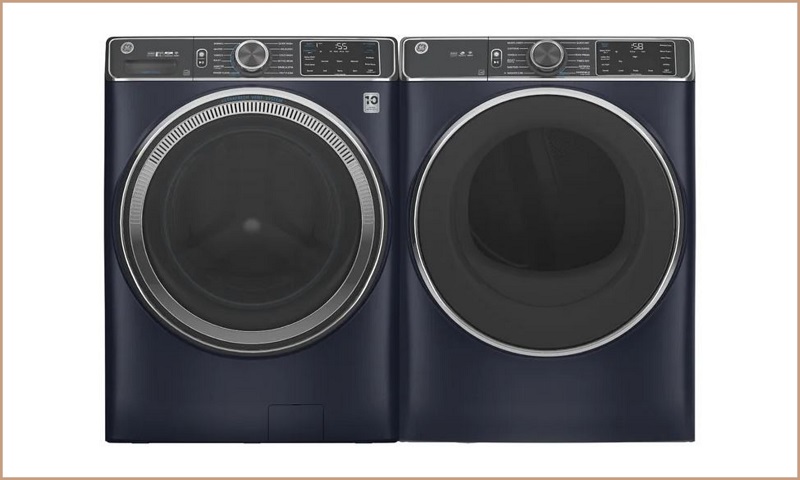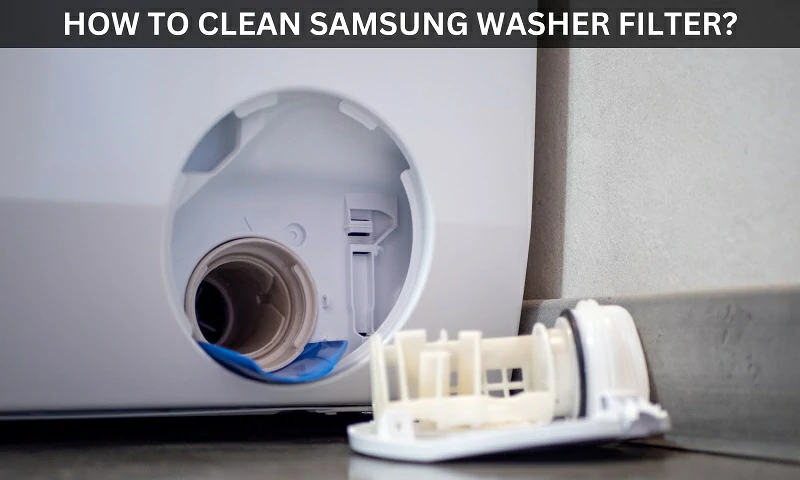From strange noises to leaks there are many issues that can arise with your GE washer. But before you rush to call a repair person, there might be a few simple solutions you can try to fix the problem yourself.
In this article, we’ll discuss some of the most common problems that occur with GE washers and provide you with troubleshooting tips to help get your appliance back up and running smoothly.

GE Washer Troubleshooting Guide
The most common problems in a GE washing machine are:
- GE washer is not Draining
- GE washer is leaking
- GE Washer Makes Loud Noise
- GE Washer smells bad
- GE Washer Locks and Unlocks Frequently
- GE Washer is not Spinning and Keeps Pausing
All these problems can be diagnosed and fixed easily on your own. You may also get error codes with these issues and you can understand which part is responsible for the trouble. Let us now get into the troubleshooting guide for each of these problems.
GE washer is Not Draining
If you notice that your GE washer is not draining properly, it can lead to water pooling at the bottom of the drum. It can be caused by a blocked drain filter, fault in the drain pump, improper installation of the drain hose, and excessive suds. You can troubleshoot the appliance with the following guidelines:
- Inspect the drain hose for clogs or kinks. Ensure that it is properly connected to the drainage system and that the end of the hose is not submerged in water.
- The washers have a drain pump filter that can get clogged with lint, debris, or foreign objects. Locate the filter, clean it, and check for any obstructions.
- If the drain pump is not functioning, it may need to be replaced. Consult your washer’s manual for instructions on how to access and replace the drain pump.
- Check the drainage system in your home for any blockages. A clogged pipe or a malfunctioning sewage system can also cause draining issues.
GE Washer is Leaking
Water leakage is commonly found problem and needs immediate attention to prevent damage to your flooring and the washer itself. It can be caused by a damaged water inlet valve, damaged tub seal, improper hose connections, and overloading. Fix the leaky washer with the following tips:
- Check all hose connections, including the inlet and drain hoses, for any leaks or loose fittings. Tighten or replace as necessary.
- A damaged tub seal can cause water to leak from the bottom of the washer. If you suspect this issue, it’s best to consult a professional for repair.
- Overloading the washer can lead to excess water splashing out during the wash cycle. Reduce the load size and redistribute the laundry evenly.
- If the GE washer is dripping water inside the tub, then check the water inlet valves and fix it.
GE Washer Makes Loud Noise
Loud noises coming from your washer can be alarming. These noises can range from loud banging to high-pitched squealing caused by different types of issues in the machine. Noises can occur in both front load and top load washers and the common reasons for noises include improper loading, debris in the tub, worn-out bearings, gears, drive belt, and couplings. You can fix the issue by finding out the type of noise from the washer and troubleshooting it with the following tips:
- Overloading or unevenly distributing the laundry inside the drum can cause banging noises during the spin cycle. Make sure your load is balanced.
- Check the drum for any foreign objects like coins, buttons, or small items that may agitate during a wash cycle and causes the noise. Remove them if found.
- Inspect the washer’s components, such as the drum, agitator, and motor, for any loose or damaged parts. Tighten or replace as needed.
- Worn-out bearings or a damaged belt can also result in strange noises. If you suspect this, consider calling a technician for repairs.
- If you hear beeping or ticking sound, it can be caused by timer in the control board and you have to fix it.
GE Washer Smells Bad
A common complaint among GE users is a foul odor emanating from the machine. This unpleasant smell can transfer to your clothes if not addressed. It can be caused by mildew, soap scum, limescale, and sewage gases from the drain pipe. You can fix a bad smelling GE washer with the following troubleshooting tips:
- Run a hot water cycle with vinegar or a specialized washer cleaner to clean the drum thoroughly.
- The drain pump filter can trap debris and odorous substances. Clean it regularly to prevent bad smells.
- After each wash cycle, leave the washer door ajar to allow air to circulate and prevent moisture buildup.
- Excessive detergent can leave behind residues that contribute to odor. Use the recommended amount of detergent according to your washer’s manual.
GE Washer Locks and Unlocks Frequently
Another issue with a GE washing machine is the lid lock complaint which causes constant locking and unlocking of the washer. It can be caused by a faulty lid lock, problem with the control panel, and wiring issues. Fix the issue with the following troubleshoot:
- Inspect the door latch and lock for any visible damage or misalignment. Ensure that the door closes securely and that there are no obstructions preventing it from locking correctly.
- In cases where a sensor or control board is suspected, it’s advisable to contact a professional technician. They can diagnose the problem accurately and replace any faulty components.
- To address electronic glitches, try performing a “soft reset” by unplugging the washer from the power source for a few minutes and then plugging it back in.
GE washer is not Spinning and Keeps Pausing
A washer that fails to spin can leave your clothes soaking wet. Also, if it frequently pauses in the middle of a wash cycle, it can ruin your other chores. A GE washer may not spin due to an imbalance in the load, problem with drive belt, and due to some issues with motor. You can also witness the GE washer pausing due to lid lock malfunction, insufficient water for wash cycle, control board issues, and clogged drain. You can fix the issue with the following:
- An unevenly distributed load can prevent the washer from spinning properly. Ensure that your laundry is evenly placed inside the drum.
- GE washers have a lid switch that prevents the washer from spinning when the lid is open. Check if the lid is securely closed.
- A loose or damaged drive belt can impede the spinning action. Inspect the drive belt and replace it if needed.
- Check the water inlet valves and the drain pipe for proper functioning.
- If none of the above solutions work, it could be a problem with the motor or the motor control board. Contact a professional technician for further diagnosis.


